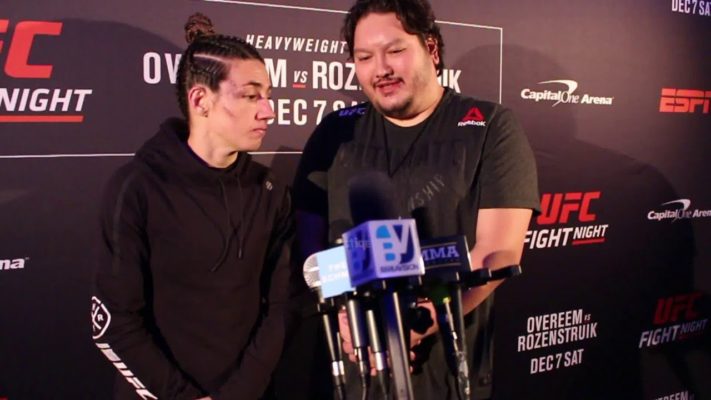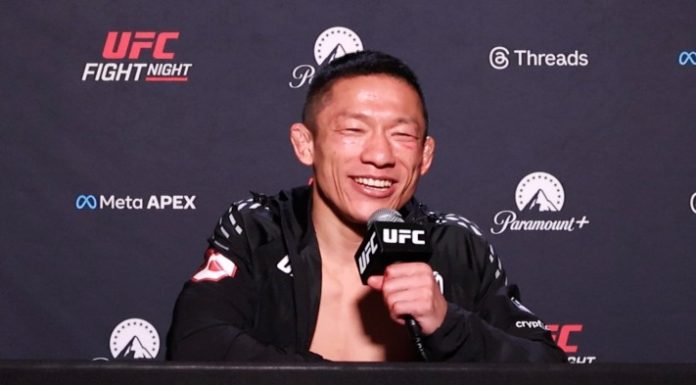
Last but not least, Brazil’s Tiago Okamura of On The Road Management, who you can see above with Marina Rodriguez backstage in Washington, D.C. Okamura’s client Virna Jandiroba also won big at UFC DC last month.
How did you get into MMA?
TO- “I was just a teenage fan back in the late 90s, we had fights shown on cable here every Saturday night, and I got hooked. I started to record them and tape trade with other fans in Brazil and around the world, and in the early 2000s, the internet forums started to become more popular and I was constantly posting on Sherdog and portal do vale tudo, I was even a moderator at Sherdog at one point.”
What got you into wanting to be a manager and how did it happen?
TO- “At portal do vale tudo I developed a reputation for being the go-to guy for Japanese MMA. One day a Brazilian based in Switzerland called Josef Borges sent me a message asking if I wanted to work with him promoting an MMA show in São Paulo. Unfortunately, Vale Tudo was banned at the time in the city so we turned to another town about an hour away called Campinas to host the show. Josef lived in Europe, and he was able to develop relationships with promoters in the region, and that is where the management side of things started. As we were preparing for our first show we also booked our first fight together, Anderson Silva heading to England to take on Lee Murray at Cage Rage 8. At that card, we also got to book two more fighters, Anderson’s teammate Silvio Urutum and vale tudo legend Johil de Oliveira.”
How do you go about finding new fighters to sign? Are you actively watching the regional scene, maybe even watching ammy fights?
TO- “At this point, I have a pretty good network around the world of partners in the management business, so I have good eyes looking for talent that looks the part. I don’t watch as much tape as I had in the past, I will always look first for results. Once I see a fighter having decent results on the regional scene, I will then go and see what they are about. If they are someone, we could help go to the next level in their careers. One thing to note is that we work mainly with non-American talent. For someone that is not American to get a contract with a big American promotion (as most are in the current scene), they need to do something exceptional at their regional scenes. Just having a decent record doesn’t mean you can get a contract, so it takes a lot of extra work and, on a lot of cases, some luck to get you to one of the big shows.”
What are some mistakes made by other managers you notice?
TO- “I think the one big thing I see is that the word manager is used very loosely in this sport. A vast number of so-called managers are actually agents, they will go and get you a money-making opportunity, get their cut, and that is it. Managing is so much more than just that, to manage is to administrate, to lead someone’s career with their best interest at heart. People sometimes take this job lightly, but when someone trusts their careers in this sport to you, they are not just giving you the reins of their employment, they are trusting you with their dreams. And this is something that has to be taken very seriously and respected above all. That is why there has to be a special relationship between a fighter and his manager. A manager has to care about his fighters as people; if you don’t feel like someone is on the same page as you, you probably shouldn’t be having them be responsible for your dreams.”
What are some ups and downs of being a manager?
TO- “Management, much like fighting, is a work of the highest highs and lowest lows. I had the privilege to have traveled all over the world and meet some fantastic people that I would have never had the pleasure of meeting had I not been involved in the sport for the past 16 years. You can eventually make ok money doing this, but if that is your goal off the bat, you are probably choosing the wrong path. It took me ten years to get a fighter in the UFC (Jessica Andrade), and I only really became a full-time manager once I had Joanna become champion in 2015. I do my best to always be with my fighters thru-out “fight week” once we finally can get them into a big organization, so we get to live through a lot of good and bad together. I have slowly learned a lot about other aspects of the sport and have been able to help them with other things, from international accounting to weight cutting. So being allowed to take part in those fighters journeys is a very special thing, both on the good and on the bad. Oh yeah, one bad thing, at least with the way I run my business, is that the better you do, the more time you will need to dedicate to your fighters. I can’t complain because I had never even dreamt of achieving what I achieved even six years ago. But I usually spend at least half of the year on the road with my fighters, and when I am home, I am connected from the time I wake up till the time I decide to go to sleep. Luckily I have been with my wife for 14 of the 16 years I have been working with MMA, so she is more understanding them most would be, given what I put her through.”
Let’s say you have a young fighter get an offer against an experienced fighter in a “dangerous fight? Are you more of a slow build like Michael Page or a fast push like Aaron Pico?
TO- “Every fighter is a specific case. As a rule, I will usually build my fighters up till they have a decent quantity of fights. Trying to increase the level of opposition as they develop until we are eventually able to match them with someone who is a former big show veteran or someone we know the big shows are looking at. But again, since I work with fighters outside of the US we rarely get a chance to develop a fighter inside a more prominent organization. We have to get them ready outside so when they do get their chance, they are ready to take on anyone they throw at them.”
What is your opinions on fighters managing themselves? How important do you think it is for a fighter to have a manager?
TO- “Like the previous question, it’s a case by case thing. Some fighters can be capable of managing themselves, especially once they get to a more prominent organization. There are for sure fighters out there that can be fantastic managers. But here is the big thing that applies to most cases, it’s a full-time job being a fighter, it’s a full-time job being a manager, just like it’s a full-time job being a coach. There are only 24 hours in a day, and you only have one pair of hands, so there is only so much one person can do by themselves. So chances are, you are probably better off finding people that are specialized in their fields to help you on your journey than trying to do it all by yourself.”
What is some advice you have for someone looking to get into the industry as a manager or someone just now starting?
TO- “Be respectful of the trust fighters give you. Honor them and what they have trusted you with. Never forget that this bond goes much further than money; you are in charge of the fighter’s dreams. If you are not ready or willing to put them first, then you probably shouldn’t be a manager, doesn’t mean you can’t work in this field, but you might be better off working as an agent rather than a manager.”
What is the toughest challenge as a manager?
TO- “To be able to read the opportunities that you can get to your talent and correctly analyze the risk-reward in question in parallel with where they are in their careers and where you expect to lead them to. One decision can make or break a career.”
Who is a client/prospect you have on the team that is for the most part, unknown but you thing has a high ceiling?
TO- “It wouldn’t be fair to name one person. If I take someone in as a client, it’s because I believe they have a high ceiling and also because they excite the MMA fan in me. I am very aware of my time and work limitations, so in respect to the fighters, I have to be very selective with who I commit.”
What is a goal you still haven’t reached but still something you want?
TO- “I have already reached my most absurd goal, which was to have a UFC Champion, and I was able to do that twice. I think on the management side it would be great to keep bringing more people up from the regional level and help them grow into champions. But outside what I really would like is to help build the ammy scene here in Brazil on a national level. We have promoted quite a bit on the ammy side here in my city, but as a country, we are still miles away from where we should be.”


















